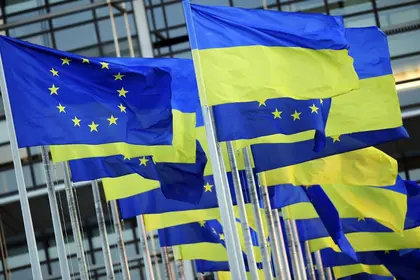With an understanding of the EU’s procedures, principles of functioning and calendar, many things can be predicted with a high degree of probability. So, let’s have a look at the 2024 calendar plan for European integration:
Integration calendar
JOIN US ON TELEGRAM
Follow our coverage of the war on the @Kyivpost_official.
Feb. 1, the EU summit will approve the Ukraine Facility – €50 billion for Ukraine for 2024-27. According to all sources, this decision should not be a problem, even in the event that Hungary’s Viktor Orbán tries to block it. All the financial and legal parameters for Option B to approve this support and get past the Hungarian veto were simply not yet agreed upon at the summit in December. On Feb. 1, all member states will be ready to make decisions without Orbán (although if he just goes out for coffee one more time, it will technically be easier for everyone).
By March, Ukraine must fulfill all four additional requirements of the European Commission, formulated in the report on enlargement in November of this year. In fact, one requirement remained – the law on lobbying. But it is important that the law only limit lobbying in the interests of oligarchs and not hinder public advocacy activities in the interests of society.
In March, there will be a new interim report of the European Commission with an assessment of the fulfillment of additional requirements, and probably a recommendation regarding the approval of the negotiating framework with Ukraine.

EU Defense Chief Calls for ‘Big Bang’ Spending to Counter Russian Threat and Strengthen Europe’s Military
The approval of the negotiating framework is the next big political decision on Ukraine’s path to the EU, which Orbán may try to block.
Then, later in the spring (perhaps as early as March), there may be a decision by the EU to approve the framework for negotiations. But in any case, this is a decision of the member states, which is made by consensus – that is, there may be a problem of the Hungarian veto again. Therefore, the approval of the negotiating framework is the next big political decision on Ukraine’s path to the EU, which Orbán may try to block.
Further on, after the approval of the negotiation framework – approximately at the end of spring – the negotiations should officially open, with the first intergovernmental conference being held. Also, depending on what will be written in the framework of the negotiations, there should be individual decisions of the member countries on opening negotiation chapters – 35 of them in total.
If the same methodology as with the Western Balkans is used, then this is a separate decision of the Council of the EU, that is, the ministers of the member countries (by consensus!) must open each chapter. But it is possible that in Ukraine’s negotiating framework, it will be possible to defend other approaches. It would be important for Ukraine to open as many chapters of negotiations as possible in the first half of 2024.
Then in June come the elections to the European Parliament. Next – summer-autumn – there will be the elections of the chairman and members of the European Commission. The mandate of the current European Commission expires on Oct. 31, 2024, by which time the composition of the new one must be determined. Moreover, the second half of 2024 is Hungary’s turn for presidency of the EU Council.
While the chairmanship of the Council of the EU does not give a country any greater voice – it does give it a greater opportunity to promote some issues for discussion and build consensus with other countries for decision-making.
Ukraine will have to accept all these demands, because if you want to join the club, then you have to accept its rules.
Beyond next year
This will be a period of “change” in the composition of the European Parliament and the European Commission. It is unlikely that Hungary will be able to block any serious decisions. Unless it can slow down the opening of new negotiation chapters with Ukraine.
Therefore, it would be important for Ukraine to receive the decision of the member states on the opening of the maximum number of chapters already in the first half of 2024. Or, even better, in the negotiation framework, to provide for their opening by the decisions of the European Commission and/or by a qualified majority of the member states.
The first half of 2025 will be Poland’s turn for the presidency of the EU Council. And this will surely be the time to start a serious conversation about the EU budget for the next seven years – 2028-2034. This will be a very important process for Ukraine, because the money for expansion, for the admission of Ukraine to the EU should be provided for in this new seven-year budget.
It is also possible to predict how these negotiations will go. Firstly, these negotiations will mainly be about the pace of adoption of European standards and harmonization of Ukrainian legislation and sectoral policies with EU norms and approaches.
To begin with, the European Commission will analyze our legislation on each chapter of the negotiations. It will conduct a so-called “screening.” Based on its results, the EU will make demands on what exactly Ukraine should change in the regulation of these areas, and when.
Ukraine will have to accept all these demands, because the principle of take it or leave it applies here – if you want to join the club, then you have to accept its rules. Ukraine will be able to trade except for transitional periods in certain justified cases.
Some preferences already granted
Thanks to the implementation of temporary EU measures to support Ukraine during the war, in fact, in 2022, Ukraine was granted additional preferences for advance accession to certain sectors of the common market – in particular, in agriculture (elimination of tariff quotas), transport services (liberalization of road transport), telecommunications (free roaming), freedom of movement of workers (access to the labor market for Ukrainian refugees who have received the status of temporary protection in EU countries).
Therefore, the EU will now pay more attention to Ukraine’s measures to implement a level playing field – competition rules, social, environmental and technical standards.
Ukraine will not bypass the problem of the Hungarian veto, but it is an element on which Kyiv has practically no influence.
If Ukrainian business thinks strategically, it will understand that it is better to prepare and adapt to these requirements as quickly as possible now, than to wait until the EU accuses Ukraine of unfair competition and starts blocking access to the Common Market. After all, the EU Common Market is built on the principles of the “four freedoms”: the movement of goods, services, capital and people, provided that an equal level of competition is ensured.
It is in order to ensure this equal competition of market players from different member states that the EU legislation establishes certain common requirements regarding the minimum acceptable level of environmental, social, technical standards, etc. So, how quickly the negotiations will progress will largely depend on Ukraine, how quickly it will be able to align and implement its legislation to EU requirements.
Many interests will be affected here, each of which will prefer to defend their positions. Although then the “horror stories” were mostly about foreign producers who would flood Ukraine with their goods, with which their own producers would not be able to compete – but now they will talk about the alleged impossibility of Ukrainian producers to transition to European standards.
It is interesting that negotiations on the labor market in Ukraine may differ from previous examples of expansion. In previous EU enlargements, negotiations on the freedom of movement of workers were always difficult and ultimately involved temporary restrictions by a number of member states. But Ukraine’s case, it seems that EU member states will be more interested in keeping Ukrainian refugees/workers who develop their economies.
Negotiation sections on fundamentals – the fight against corruption, judicial reform, human rights, etc. – will be a priority for the EU. Most likely, these chapters will be the first to be opened and the last to be closed. On these issues, the EU’s demands will be supported by the IMF with its “structural beacons” and the US with its “reform benchmarks.”
The EU will, most likely, add new demands here to ensure that the Ukrainian political and legal system can be trusted.
Also, if you look at Ukraine’s current pace, it can be predicted that it will not be ready to join the EU in two years, as government officials promise.
Thus, in the summer of 2022 there were optimistic statements about the fulfillment of seven EU requirements related to the candidate status of Ukraine by the end of 2022. In fact, it came out by the end of 2023. These were just a few requirements, and there will be many more to come.
The European Commission assessed the state of compliance of Ukraine in all sectors of the future negotiations in its November report. If compared with those received by the countries of the Western Balkans, it is clear that Ukraine is not ahead of them at all.
And while on those few issues where there was political attention, Ukraine showed progress, on others it did not. For example, in the transport sector, where Ukraine gained access to the road transport market thanks to the 2022 liberalization agreement, the European Commission saw practically no dynamics of approximation to EU standards over the past year.
And the screening, which the European Commission will conduct before the start of negotiations on all sectors, will be deeper and more detailed, and therefore will certainly show more problems and, accordingly, tasks, than the November report of the European Commission.
The EU will, most likely, add new demands here to ensure that the Ukrainian political and legal system can be trusted.
In turn, the government’s desire to quickly fulfill EU requirements can lead to hasty decision-making without proper communication with the target audience, taking into account the positions of interested parties, and involving the opposition.
A clear example of such a scenario was the adoption of legislation on PEPs (Politically Exposed Persons). On the other hand, as shown by the example of the adoption of amendments to the legislation on national minorities, in the presence of political will, it is possible to find consensus solutions even in very difficult areas.
Ukraine needs to build a strategic political unity around EU integration issues, as was done in those countries (Poland and others) that have successfully negotiated and joined the EU.
In summary, Ukraine will not bypass the problem of the Hungarian veto, but it is an element on which Kyiv has practically no influence. Our task is to preserve the “all minus Hungary” consensus of the EU member states, and for this Ukraine must demonstrate exemplary fulfillment of all fundamental requirements and build a high-quality reform process in all sectors with the involvement of stakeholders.
In addition, it is necessary for Ukraine to start communication with businesses in the EU countries (to dispel fears and show opportunities from Ukraine’s integration), and to prepare for negotiations on the future budget parameters of Ukraine’s entry into the reformed EU – which will most likely address the common agricultural and regional policies of the EU, as well as rules for filling the EU budget.
These are all difficult tasks, and many things can go wrong. No one will give a guarantee that the negotiations will end successfully, that they will not be hindered by a lack of political will on both sides.
For Ukraine, which is integrating into the EU during a war, this is a huge challenge – but also a historic chance that cannot be wasted.
The views expressed in this opinion article are the author’s and not necessarily those of Kyiv Post.
Dr. Viktor Dovhan was Ukraine’s Deputy Minister of Infrastructure on European Integration 2016-2019.
You can also highlight the text and press Ctrl + Enter









